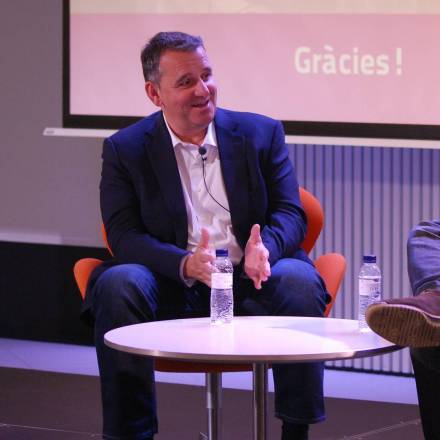
It is huge growth and yet it contains a paradox. "Managing 1,300 people is boring. When you are in a start-up everyone tells you what they are thinking, you enjoy yourself and you get to have experiences with people," he says. "When the business is large, you enter a room and everyone goes quiet. When you ask them what they think, it's a case of 'damn, why me?'" The experienced entrepreneur knows that what is best is being "in the trenches, with so many people it seems as if nothing ever happens."
After selling Anuntis, which took seven years, he is now back in business with Redarbor. "It is a holding investment company for classified ad businesses. It has taken two years and we already have 250 employees and the leading job websites in Brazil, Colombia and Mexico," he says proudly. Present in 25 countries, with offices in six of them, he points out that sales have multiplied four times since last year. "In January, a billion pages had been visited," he reveals with satisfaction.
"We are a company that specialises in classified ads," he says about the investments in Redarbor. "There are so many people providing funding that in the end it seems like a supermarket. I think that it is very important to see what an investor can bring apart from money," he says. For González Castro, we are currently experiencing an "investment surplus", a term he distinguishes from "bubble". "In a bubble there is no value, and here there is. The thing is that it is more expensive than it should be," he points out.
Incommunicado until 11
"Doing what is important instead of what is urgent is difficult," David González says. That is why he admits to trying not to have any meetings until 11am in order to calmly look at the previous day's figures. "Without this period to go over the figures, it would not work," he says.
The digital tsunami
David González Castro's experience is particularly relevant for his constant evolution over a long career. "We went through three economic crises and I have always tried to keep the same attitude," he says. It is a strategy based on "bringing in the sails even before the crisis has been noted, to keep the company going and to be prepared for the opportunities that will arise when the storm is over."
Coming from paper turned Anuntis into the number one online publication, with leading websites in all the sector's verticals (Fotocasa, Coches.net or Infojobs). "Digitalisation has been like a tsunami of different waves, and a lot of people did not take the first one seriously," he says, recalling how in 2001 "the banks did not believe anything about the Internet."
He points to mobile and apps as the next wave of the digital tsunami, an environment in which "we have to understand that there will be no end to the changes." This mentality that is so open to the unexpected, he says, is what has kept him going. "I continue to have business because I am paranoid. If I wasn't, I would have fallen away some time ago."
A voluminous business
David González Castro does not tire of repeating that "volume is vital in the classified ad business." At the same time, he warns that the role of the Internet, and soon mobile, requires a lot of simplification because there is increasingly less space. "If WhatsApp has not been able to charge, charging for other things can be hard," he says in reference to apps such as Wallapop. "Real estate, cars or work are easier to monetise; but in C2C we will have to see. Perhaps publicity models are not enough, and it is an issue still up in the air," he admits without daring to make any predictions.
Whatever the case, if the business requires volume, going international is a priority. However, González Castro is one of those who does not believe in the born global culture. "First you need to consolidate and test the model. If you have to adjust the project, doing it in five countries is brutally expensive," he says. In his opinion, "it is better to consolidate, make money, and then later expand abroad."